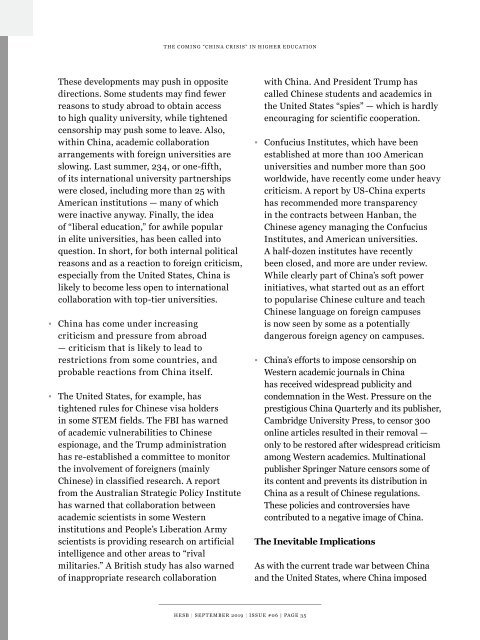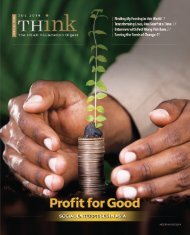Higher Education in Southeast Asia and Beyond #Issue 06
In this special issue, we feature articles arising from the 6th Global Higher Education Form 2018 (GHEF 6.0) held from 8 to 10 October 2018 in Putrajaya, Malaysia. We also look at China's influence and relationships in higher education, among other topics.
In this special issue, we feature articles arising from the 6th Global Higher Education Form 2018 (GHEF 6.0) held from 8 to 10 October 2018 in Putrajaya, Malaysia. We also look at China's influence and relationships in higher education, among other topics.
You also want an ePaper? Increase the reach of your titles
YUMPU automatically turns print PDFs into web optimized ePapers that Google loves.
THE COMING “CHINA CRISIS” IN HIGHER EDUCATION<br />
These developments may push <strong>in</strong> opposite<br />
directions. Some students may f<strong>in</strong>d fewer<br />
reasons to study abroad to obta<strong>in</strong> access<br />
to high quality university, while tightened<br />
censorship may push some to leave. Also,<br />
with<strong>in</strong> Ch<strong>in</strong>a, academic collaboration<br />
arrangements with foreign universities are<br />
slow<strong>in</strong>g. Last summer, 234, or one-fifth,<br />
of its <strong>in</strong>ternational university partnerships<br />
were closed, <strong>in</strong>clud<strong>in</strong>g more than 25 with<br />
American <strong>in</strong>stitutions — many of which<br />
were <strong>in</strong>active anyway. F<strong>in</strong>ally, the idea<br />
of “liberal education,” for awhile popular<br />
<strong>in</strong> elite universities, has been called <strong>in</strong>to<br />
question. In short, for both <strong>in</strong>ternal political<br />
reasons <strong>and</strong> as a reaction to foreign criticism,<br />
especially from the United States, Ch<strong>in</strong>a is<br />
likely to become less open to <strong>in</strong>ternational<br />
collaboration with top-tier universities.<br />
▪▪<br />
Ch<strong>in</strong>a has come under <strong>in</strong>creas<strong>in</strong>g<br />
criticism <strong>and</strong> pressure from abroad<br />
— criticism that is likely to lead to<br />
restrictions from some countries, <strong>and</strong><br />
probable reactions from Ch<strong>in</strong>a itself.<br />
▪▪<br />
The United States, for example, has<br />
tightened rules for Ch<strong>in</strong>ese visa holders<br />
<strong>in</strong> some STEM fields. The FBI has warned<br />
of academic vulnerabilities to Ch<strong>in</strong>ese<br />
espionage, <strong>and</strong> the Trump adm<strong>in</strong>istration<br />
has re-established a committee to monitor<br />
the <strong>in</strong>volvement of foreigners (ma<strong>in</strong>ly<br />
Ch<strong>in</strong>ese) <strong>in</strong> classified research. A report<br />
from the Australian Strategic Policy Institute<br />
has warned that collaboration between<br />
academic scientists <strong>in</strong> some Western<br />
<strong>in</strong>stitutions <strong>and</strong> People’s Liberation Army<br />
scientists is provid<strong>in</strong>g research on artificial<br />
<strong>in</strong>telligence <strong>and</strong> other areas to “rival<br />
militaries.” A British study has also warned<br />
of <strong>in</strong>appropriate research collaboration<br />
with Ch<strong>in</strong>a. And President Trump has<br />
called Ch<strong>in</strong>ese students <strong>and</strong> academics <strong>in</strong><br />
the United States “spies” — which is hardly<br />
encourag<strong>in</strong>g for scientific cooperation.<br />
▪▪<br />
Confucius Institutes, which have been<br />
established at more than 100 American<br />
universities <strong>and</strong> number more than 500<br />
worldwide, have recently come under heavy<br />
criticism. A report by US-Ch<strong>in</strong>a experts<br />
has recommended more transparency<br />
<strong>in</strong> the contracts between Hanban, the<br />
Ch<strong>in</strong>ese agency manag<strong>in</strong>g the Confucius<br />
Institutes, <strong>and</strong> American universities.<br />
A half-dozen <strong>in</strong>stitutes have recently<br />
been closed, <strong>and</strong> more are under review.<br />
While clearly part of Ch<strong>in</strong>a’s soft power<br />
<strong>in</strong>itiatives, what started out as an effort<br />
to popularise Ch<strong>in</strong>ese culture <strong>and</strong> teach<br />
Ch<strong>in</strong>ese language on foreign campuses<br />
is now seen by some as a potentially<br />
dangerous foreign agency on campuses.<br />
▪▪<br />
Ch<strong>in</strong>a’s efforts to impose censorship on<br />
Western academic journals <strong>in</strong> Ch<strong>in</strong>a<br />
has received widespread publicity <strong>and</strong><br />
condemnation <strong>in</strong> the West. Pressure on the<br />
prestigious Ch<strong>in</strong>a Quarterly <strong>and</strong> its publisher,<br />
Cambridge University Press, to censor 300<br />
onl<strong>in</strong>e articles resulted <strong>in</strong> their removal —<br />
only to be restored after widespread criticism<br />
among Western academics. Mult<strong>in</strong>ational<br />
publisher Spr<strong>in</strong>ger Nature censors some of<br />
its content <strong>and</strong> prevents its distribution <strong>in</strong><br />
Ch<strong>in</strong>a as a result of Ch<strong>in</strong>ese regulations.<br />
These policies <strong>and</strong> controversies have<br />
contributed to a negative image of Ch<strong>in</strong>a.<br />
The Inevitable Implications<br />
As with the current trade war between Ch<strong>in</strong>a<br />
<strong>and</strong> the United States, where Ch<strong>in</strong>a imposed<br />
HESB | SEPTEMBER 2019 | ISSUE #<strong>06</strong> | PAGE 35





